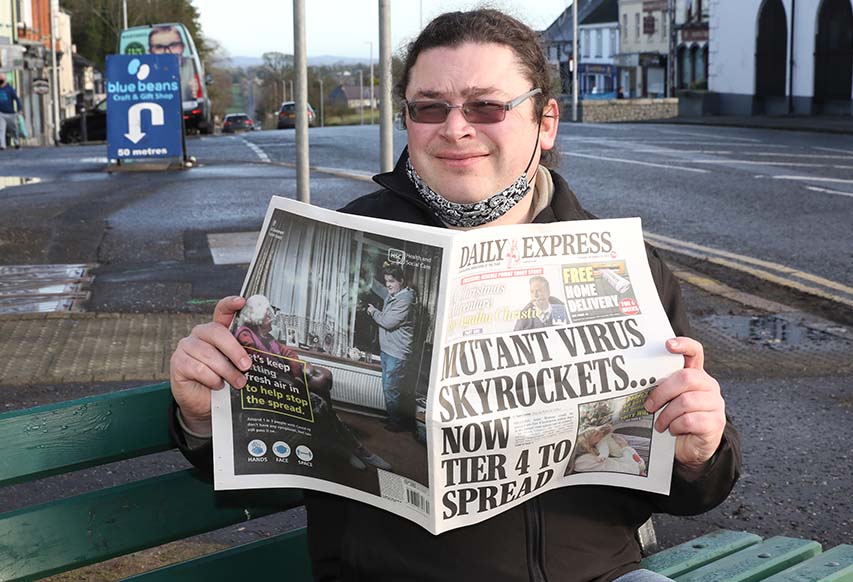Castlewellan man David Boden writes about his thoughts and experience of having Aspergers Syndrome.
In today’s society, there are few if any people that don’t have to contend with an issue of a physical or mental nature, if not both.
I’m not sure if the word disability is appropriate to use but if we use the term ‘condition’, one can turn a diagnosis to an advantage writes David Boden.
Stigma can arise from the fact that not all conditions are visible. If you pass a stranger in the street, the difficulties that are present in their life are instantly recognisable from their face, be it that they are blind or born with Downs Syndrome.
I will be 40 this year and my diagnosis of Asperger’s Syndrome has been official for a little more than half of my life.

There has been progress in my life in this period as well as society as a whole in understanding issues in relation to Aspergers.
But sadly it seems ignorance and prejudice is something that will never completely cease to exist. Consequently, we all have a role to play in becoming more tolerant and trying to level out the difficult bumps.
Supermarkets such as Lidl are officially Autism Friendly, and in the spirit of such, Thursday night from 6-8pm is Autism Aware time in Lidl stores province-wide.
So what does being Autism Friendly really mean ? It is a package which offers:
- Reduced sound and lighting
- Silent tills
- No music or in-store announcements
- And assistance dogs are welcome.
When my diagnosis was confirmed decades ago, few people had heard of Aspergers Syndrome back then including staff and patients in psychiatric hospitals. Now there are many organisations providing support to the Autistic Spectrum and their clientele reaches across the generations .
Many of my generation only had their diagnosis confirmed in their adult lives. Although no two people diagnosed are the same, there are some constants for many. This often is presented as an intense level of in creativity in the arts and academia.
There are celebrities with an autistic diagnosis which range from actor Dan Ackroyd to scientist Temple Grandin. Their success is an example of how much can be achieved, but this is a point which is grossly overlooked.
When I have used such figureheads as examples many people including those in the medical profession have casually dismissed my point as “one of those things”.
Another constant for those on the spectrum is the cliche of “being misunderstood”. Being misunderstood has driven me in determination and in turn has enabled me to excel in many paths of creativity.
Being misunderstood has often been the reason why my tenure in employment has often been sadly short lived. It is a indeed progress to see crafts, drama, music and sport offered as a therapy for those who experience mental and/or physical impairment.
But I believe there isn’t enough advocacy for education and employment to allow for those with Aspergers to adjust and adapt to their environment, and similarly, workers etc should be inducted about the needs of those who have Aspergers.
Many of those who study in further education end up working in something completely unrelated to what they have studied, particularly if they have studied an art subjects. There are also highly educated individuals on the autistic spectrum and simply lose out in job advancement to those with less education and experience as communication is also a common obstacle to many with Aspergers.
And I have a solution too I would like to see as a model. It would launch, protect careers and support those individuals across all artistic pursuits in the creative industries who have mental or physical issues.
Ideally, this would cover union representation and counselling and in turn universities would design and deliver degrees where their graduates would be qualified as both human resource specialists and specialists in areas that the cover Autism spectrum.
For years this is a concept I’ve tried to push and sadly I’ve never been taken seriously. I’ve told medics this could and should be possible given how many celebrities are patrons of numerous charities. They tell me this is beyond their authority as well as the trust’s funding. The cynic in me dismisses this as a convenient excuse. I’d personally like to think if I was a doctor, I’d willingly take a pay cut for such a venture to materialise. But ultimately it is something that the politicians would need to grapple with.
I once asked a social worker why such an initiative does not exist and the answer I was given was: ” Because your career would be built upon pity”. The irony is that if governments funded such ventures there would be more employment and less unemployment benefits to be paid which would in turn minimise crime rate and further health-related issues emerging from the misunderstandings around Aspergers.
It would also be a step in the right direction if colleges and employers together sought a diagnosis as part of an essential criteria which may vary depending on the course or position.
For example, I know someone with an autistic diagnosis with a PhD in theoretical physics and it is suspected Albert Einstein and Issac Newton had Asperger’s. Universities should offer scholarships and bursaries in light of such.
It has also been a time-honoured tradition that many piano tuners have been blind and there are many talented musicians that are blind, such as Stevie Wonder ,Ray Charles and Moondoog.
It is also a fact of life that if one walked into the office of The Equality Commission, it is likely there will be at least one employee in a wheelchair demonstrating the principle of inclusion.
That example exemplifies a genuine mission to promote equality to the same if not lesser extent than employing mixed race and transgender.
























